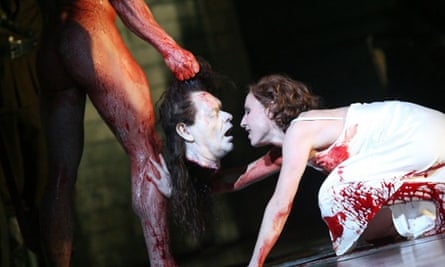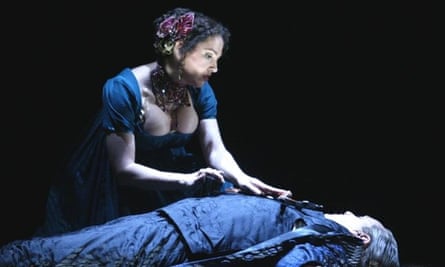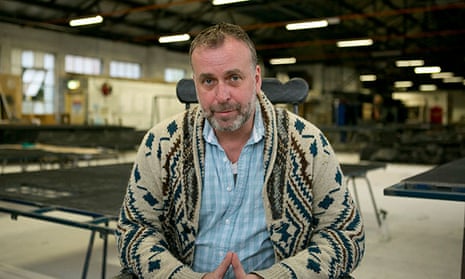Twenty opera singers stand arrayed on a plywood rehearsal room platform, brandishing unlit torches, pitchforks and a musket. “I hate you all,” yells David McVicar, eyeballing them with fury, fists clenched as he spins on his stockinged feet. “Fuck you all!”
The 47-year-old opera director sinks to the stairs at Opera Australia’s Surry Hills headquarters, bows his head and raises his hands to his temples. “Shoot me! Shoot me!”
Playing Leporello, the Melbourne-born bass/baritone Shane Lowrencev leans in and deadpans: “In Italian this time?”
Just under three weeks from opening night of this dark but sometimes funny Don Giovanni, the act two sextet "Sola sola in buio loco (All around so dark and lonely)" is sounding full and confident, but McVicar is a perfectionist. It’s almost 4.30pm on Friday. And he’s tired.
Over the next two years, the performers will have grown accustomed to McVicar’s recitative of f-bombs and his perfectionist, tactile ways. One of the world's most celebrated opera directors, the man opera houses call on when they want to dramatically re-imagine core works, he has signed with Opera Australia to direct a Mozart trilogy. First comes this Don Giovanni, which McVicar has previously staged with a different set designer in Britain and in Belgium; then, next year, The Marriage of Figaro; and, finally, in 2016, Cosi Fan Tutte.
The singers regroup for one last go. Behind conductor Jonathan Darlington, McVicar sits on a chair next to the opera’s choreographer, his partner Andrew George, a hulking Welshman in a red flannel shirt. The pair married in the UK three years ago.
The sextet is performed with precise energy. McVicar shouts “wonderful tension” and “fabulous”. George applauds.
It's a moment of harmony. An hour earlier, both had jumped on stage to guide a hunting party scene. But, stepping off, the director stopped his choreographer short.
McVicar: “Not that way.”
George: “Yeah, but what’s the other option?”
McVicar: “Oh, for fuck’s sake.”
George, nonplussed: “I’m not on the same wavelength.”
McVicar then grew fed up with this reporter’s note taking. “You’re writing all the time. It’s distracting!” Later, McVicar approaches and apologises, saying he had been incorrectly informed that Guardian Australia had been present in rehearsals all afternoon to interview the set designer, prompting McVicar to admonish his apologetic assistant director: “Why not just tell me? You’re pussyfooting around with me. Let’s do the interview now.”

I ask McVicar what it’s like to create work with his husband. “We don’t always work together, but we work together frequently,” he says. “We met through work, and we still work together because it means we can travel together. Because so many people in this business have short-lived relationships and marriages bust up simply because people are on the road.”
McVicar trained as an actor, which he says explains his own methods of leaping into the rehearsal chorus with props to show what he wants, or his assured grabbing and guiding of actors’ arms to the desired marks, or pushing his body close to theirs or locking forehead-to-forehead. Action and demonstration is the clearest, simplest way to work with singers with different first languages. But he knows no other way to direct, he insists.
McVicar grew up in Glasgow and discovered opera through television. His Don Giovanni is broken open psychologically. The director speaks of having to “empty the head” of everything New Zealand-born baritone Teddy Tahu Rhodes knew about playing the eponymous aristocratic lothario in five previous productions.
Rhodes’ deep voice has been thrumming the rehearsal room most of the day, as he strutted in black cape, top hat and silver-handled cane. “We’re exploring the psychopathic part of Don Giovanni because it suits Teddy. He’s got fantastic, manic energy, and Teddy is very interested in the dark side of Giovanni, not making him charming. Sort of playing him as a clinical psychopath who completely objectifies the world and the people around him.”
McVicar says he cannot say how his own lower middle-class background affects his directorial choices, nor does that upbringing pique any interest in holding an amoral aristocrat like Giovanni to account for his actions. US opera blogger William Burnett, who saw a McVicar production of Don Giovanni imported by the San Francisco Opera in 2007, wrote of McVicar’s belief that operas in the standard repertory can connect with a broader audience if they are “acted in a way that demonstrates the underlying social conflict and sexuality that simmers beneath almost all of them”.

McVicar, partial to performers slapping faces and rubbing crotches on stage, agrees with Burnett’s take on his work. “If you’re obsessed with opera, you do feel evangelical about it. You do want to offer it to people, and everyone to be as excited about it as we are, which is impossible, but more people should have the opportunity to experience it well performed, to see whether it does touch them.
“What I complain about all the time is the ticket price. It’s such an expensive art form to get on. There’s so many people involved and everybody has to be paid.”
Transplanting operas to modern settings or getting singers to wear jeans as an attempt to connect with audiences is “crap”, however. “I don’t believe in cosmetic makeovers in operas,” he says. “Getting the singers to invest in their roles and getting them to act properly as actors, these characters who can often be quite conventional suddenly come to life and be three dimensional. You do that in a plethora of settings. You can do it in modern dress, but only if there’s something intrinsic in the performances, if there’s a story being told within the actors.
“But you can also leave it in period and be just as surprising.”
Finally leaving Opera Australia’s headquarters for the evening, McVicar chats about the recent dumping of homophobic soprano Tamar Iveri from the company’s production of Otello – “I felt sorry for her until I read what she wrote”.
Even as he heads off down Elizabeth Street with a satchel over his shoulder, on the threshold of Friday night, he’s contemplating a Saturday morning rehearsing some of the Don Giovanni performers. “I think they’re used to coasting. I pull them up all the time. If I can see there’s no motivation behind an action, I say, ‘Stop it, stop it’.”
- Don Giovanni opens at Sydney Opera House on 25 July.

Comments (…)
Sign in or create your Guardian account to join the discussion